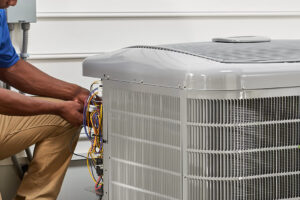 When it comes to home maintenance, one of the most important systems to keep an eye on is your air conditioner (AC). While AC units are built to last, they are not immune to wear and tear. Over time, the efficiency and performance of your AC may decline, leading to higher energy bills and an uncomfortable living environment. So, how often should you replace your air conditioner? In this comprehensive guide, we will explore the signs that indicate it’s time for a replacement, the average lifespan of AC units, and important factors to consider before making a decision.
When it comes to home maintenance, one of the most important systems to keep an eye on is your air conditioner (AC). While AC units are built to last, they are not immune to wear and tear. Over time, the efficiency and performance of your AC may decline, leading to higher energy bills and an uncomfortable living environment. So, how often should you replace your air conditioner? In this comprehensive guide, we will explore the signs that indicate it’s time for a replacement, the average lifespan of AC units, and important factors to consider before making a decision.
Signs Your Air Conditioner Needs to Be Replaced
- Inefficient Cooling: One of the telltale signs that your AC is nearing the end of its lifespan is when it starts to struggle with cooling your home. If you notice that your AC is blowing warm or inconsistent air, it may be time for a replacement.
- Lack of Airflow: A decrease in airflow from your AC vents is another indicator that your unit is not functioning properly. This could be due to a faulty compressor or blocked/damaged vents. While repairs may be possible, if the issue persists or becomes costly, it might be more cost-effective to invest in a new unit.
- Excessive Moisture and Leakage: While some condensation around your AC unit is normal, excessive moisture and leakage can be a sign of a serious problem. If you notice refrigerant leaks or large pools of water around your unit, it’s crucial to address the issue promptly to prevent further damage and potential health risks.
- Unusual Sounds: Unusual sounds coming from your AC unit, such as grinding, rattling, or squealing noises, should not be ignored. These noises often indicate significant issues, such as a belt slipping out of place or broken motor bearings. If left unaddressed, these problems can lead to more extensive repairs or the need for a replacement.
- Zones Not Cooled: If certain areas of your home are not adequately cooled while others are, it could be a sign of a malfunctioning thermostat. While this may not require a full AC replacement, it’s important to have a professional assess and repair the thermostat to ensure optimal cooling throughout your home.
- Age of the Unit: On average, AC units last between 10 to 15 years. If your unit is older than this, it may be more cost-effective to replace it rather than investing in frequent repairs. Additionally, newer models are often more energy-efficient, which can lead to long-term savings on your energy bills.
- Frequent Repairs: If you find yourself repeatedly paying for repairs on your AC unit, it may be time to consider a replacement. Ongoing repairs can quickly add up in cost, and at a certain point, it becomes more financially prudent to invest in a new unit.
Average Lifespan of Air Conditioning Units
The average lifespan of an air conditioning unit depends on various factors, including maintenance, usage, and environmental conditions. With proper care and regular maintenance, an AC unit can last between 10 to 15 years. However, it’s essential to note that older units may become less efficient over time, leading to higher energy consumption and reduced cooling capacity.
Factors that can impact the lifespan of your AC unit include:
- Maintenance: Regular maintenance, such as cleaning filters and air ducts, can extend the lifespan of your AC unit. Neglecting maintenance can result in reduced efficiency and premature failure.
- Usage: The frequency and duration of AC usage can impact its lifespan. Units that are used more frequently or in extreme weather conditions may experience more wear and tear.
- Environmental Conditions: The climate and environmental conditions in your area can affect the lifespan of your AC unit. Units exposed to extreme temperatures or high humidity levels may experience faster deterioration.
Factors to Consider Before Replacing Your AC Unit
Deciding whether to repair or replace your air conditioner requires careful consideration of several factors. Here are some important points to keep in mind:
- Cost of Repairs: Evaluate the cost of repairs compared to the age and condition of your AC unit. If the repairs are significant and the unit is nearing the end of its lifespan, it may be more cost-effective to invest in a new unit.
- Energy Efficiency: Older AC units tend to be less energy-efficient compared to newer models. If you notice a significant increase in your energy bills or your unit has a low SEER rating, upgrading to a more energy-efficient unit can lead to long-term savings.
- Warranty Coverage: Check if your AC unit is still under warranty. If the warranty covers the necessary repairs, it may be more economical to have them done. However, if the warranty has expired, the cost of repairs may outweigh the benefits.
- Refrigerant Compatibility: If your AC unit uses R-22 refrigerant, which is being phased out due to environmental concerns, it may be worth considering a replacement. As of 2020, R-22 refrigerant will no longer be produced, making it more challenging and costly to repair units that rely on it.
- Home Improvement Plans: If you are planning significant renovations or upgrades to your home, it may be a good time to replace your AC unit. This ensures that your cooling system aligns with the overall improvements you are making to your property.
- Long-Term Plans: Consider how long you plan to stay in your current home. If you are planning to sell in the near future, a new AC unit can be an attractive selling point. However, if you are staying for an extended period, investing in a new unit can provide long-term comfort and energy savings.
Knowing when to replace your air conditioner is crucial for maintaining a comfortable living environment and avoiding costly repairs. By paying attention to the signs of an aging AC unit and considering factors such as age, efficiency, and repair costs, you can make an informed decision about whether to repair or replace your unit. Remember to consult with a qualified HVAC professional to assess your specific situation and provide expert advice tailored to your needs.
Contact Us (954-909-4281) For a Free Estimate
Book an Appointment
 About South Florida Ducts
About South Florida Ducts
Air Duct Cleaning
We remove the maximum amount of the dirt and dust possible.
> Learn More
Air Duct Restoration
Hospital grade duct restoration when ducts need more than a vacuuming.
> Learn More
New Air Ducts Installed
New air ducts vastly improve your AC’s efficiency and overall air quality.
> Learn More
A/C Services
From routine maintenance visits to custom installations, SFD does it all and does it well.
> Learn More

 About South Florida Ducts
About South Florida Ducts